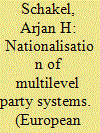| Srl | Item |
| 1 |
ID:
123012


|
|
|
|
|
| Publication |
2013.
|
| Summary/Abstract |
This article addresses the effects of decentralisation reforms on regionalist parties' electoral strength. It takes up the debate between 'accommodatists' (i.e., electoral loss due to policy accommodation) and 'institutionalists' (i.e., electoral gain due to institutional empowerment). These effects depend on the electoral venue considered - regional or national - and on the ideological radicalism of a given regionalist party - secessionist or autonomist. This study finds that increases in the level of decentralisation are positively associated with higher scores for autonomist parties in regional elections, while they are not statistically significantly correlated with secessionist parties' electoral performances. In contrast, in national elections, decentralisation reforms seem to penalise autonomist parties more than secessionist ones. These findings are based on the analysis of a novel dataset which includes regional and national vote shares for 77 regionalist parties in 11 Western democracies from 1950 until 2010.
|
|
|
|
|
|
|
|
|
|
|
|
|
|
|
|
| 2 |
ID:
120138


|
|
|
|
|
| Publication |
2013.
|
| Summary/Abstract |
The concept of 'nationalisation' is vigorously discussed in the literature and three dimensions have been proposed. A first dimension considers the extent to which a party's vote in territorial units varies across time and this is labeled 'dynamic nationalisation'. 'Distributional nationalisation' focuses on the degree to which there is an equal distribution of party votes across territorial units. Finally, 'party-linkage nationalisation' concerns the extent to which candidates link together under common party labels. In addition to a conceptual debate there has been a simultaneous debate on the measurement of the various forms of nationalisation. This article contributes to both debates and argues that most of the literature on nationalisation suffers from a methodological nationalism bias - that is, the tendency of many scholars to choose the statewide level and national election as the natural unit of analysis. This claim is supported by a conceptual and empirical analysis regarding the effects of decentralisation on nationalisation. The conceptual analysis shows that the non-robust findings of many studies concerning the effects of decentralisation on nationalisation can be related to the methodological nationalism bias. An effect of decentralisation is found once nationalisation is conceptualised with regard to its multilevel dimension and the measurements of nationalisation are differentiated according to parties, regions and type of elections (national or regional). An empirical analysis on the nationalisation of party systems, parties and regions in 18 countries for national and regional elections held between 1945 and 2009 shows that regional authority has a significant and robust effect on regions and regional elections but not on parties, party systems and national vote shares.
|
|
|
|
|
|
|
|
|
|
|
|
|
|
|
|